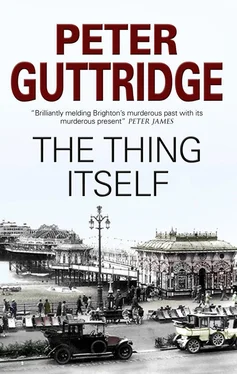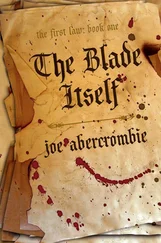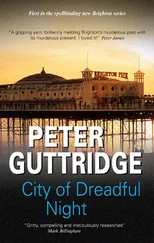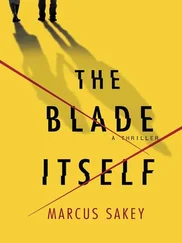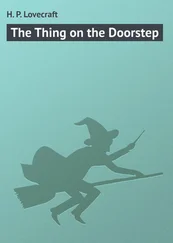Peter Guttridge - The Thing Itself
Здесь есть возможность читать онлайн «Peter Guttridge - The Thing Itself» весь текст электронной книги совершенно бесплатно (целиком полную версию без сокращений). В некоторых случаях можно слушать аудио, скачать через торрент в формате fb2 и присутствует краткое содержание. Жанр: Триллер, на английском языке. Описание произведения, (предисловие) а так же отзывы посетителей доступны на портале библиотеки ЛибКат.
- Название:The Thing Itself
- Автор:
- Жанр:
- Год:неизвестен
- ISBN:нет данных
- Рейтинг книги:5 / 5. Голосов: 1
-
Избранное:Добавить в избранное
- Отзывы:
-
Ваша оценка:
- 100
- 1
- 2
- 3
- 4
- 5
The Thing Itself: краткое содержание, описание и аннотация
Предлагаем к чтению аннотацию, описание, краткое содержание или предисловие (зависит от того, что написал сам автор книги «The Thing Itself»). Если вы не нашли необходимую информацию о книге — напишите в комментариях, мы постараемся отыскать её.
The Thing Itself — читать онлайн бесплатно полную книгу (весь текст) целиком
Ниже представлен текст книги, разбитый по страницам. Система сохранения места последней прочитанной страницы, позволяет с удобством читать онлайн бесплатно книгу «The Thing Itself», без необходимости каждый раз заново искать на чём Вы остановились. Поставьте закладку, и сможете в любой момент перейти на страницу, на которой закончили чтение.
Интервал:
Закладка:
The prisoners were cowed but well fed. Two, neither of them older than eighteen, were wearing snipers’ camouflage jackets and the blue armbands of the Herman GOring Division. The other four were Czech deserters from the 362 Infantry Division. I spoke with them quietly for ten minutes, then went with Miller to see the commander, Major Ian Moore.
‘Their officer deserted the snipers yesterday,’ I reported. ‘They say there are two companies of the Hermann Goring Division in the area. The Czech deserters say they saw thirty Mark IV Panzer tanks north of the town yesterday. Looks like Chiusi is more strongly defended than HQ realizes.’
Chiusi was an irritation to Moore, who was eager to be in on the main push to dislodge the German army from central and northern Italy. He shook his head vigorously.
‘Tanks in such force? No, no. They aren’t going to hang around to defend Chiusi. They’ll be heading north to support Kesselring’s Gothic Line. My intelligence has it there is only a parachute division in the town itself. I intend to have taken Chiusi and be advancing north within forty-eight hours.’
THIRTY-NINE
Victor Tempest exercise book four cont.
At five that evening ‘B’ Company arrived to support our advance on Chiusi. Moore frowned and tutted when I repeated to its commanding officer, Major Arlington, what the deserters had told me about the strength of opposition in the town. Moore gave his own view. Forcefully.
Arlington frowned at me.
‘I tend to agree with Major Moore,’ he said. ‘Chiusi has no strategic value. There is nothing there to warrant defence in depth. We will proceed as planned. I understand, Captain Tempest, that you are in something of a hurry to get there. Do you wish to join us this evening?’
It was a fresh night. As ‘B’ Company moved cautiously up the road, I felt alert and vigorous. I could smell honeysuckle and wet earth, feel the cold wind on my face. I walked lightly, carrying a machine pistol I’d taken from one of the Czech prisoners.
When the Company was within five hundred metres of the town, Arlington sent three patrols ahead to reconnoitre. One got to within ten yards of an Etruscan arch at the entrance to the town before it was challenged by a sentry and quickly withdrew. The other two walked into German posts and came under heavy rifle and machine-gun fire. One man was killed, others wounded.
It was two in the morning. Arlington had the company dig in and rest for a couple of hours. Near dawn he invited me to lead a six-man patrol to observe enemy movements.
The mist lay heavy on the road. I sent two men ahead to act as a listening post. When the mist dissolved with the coming of the dawn, I saw the two men were completely overlooked from a church tower to the right and the tower of an old fort to the left. A couple of minutes later the Germans spotted the exposed soldiers and began rapidly firing down on them. The four of us laid down covering fire as the two men made a dash back down the slope, bullets slashing the air around them.
We withdrew. At six in the morning, I commandeered a bench in the station waiting room. I don’t know how long I slept — possibly only minutes — before I was woken by the deafening roar of the Allied artillery opening up on the town. Ten minutes later there was an ear-splitting explosion and I was thrown off my rudimentary bed. The Germans were responding with concentrated Nebelwerfer and mortar fire on the station.
Nebelwerfers were always alarming. The name suggested they fired smoke mortars but the Germans often used them to fire chemical weapons. These seemed to be delivering smoke and low-grade explosives. For the moment.
I gave up any idea of sleep. I withdrew with other soldiers to the shore of Lake Chiusi and waited there, exhausted but awake, whilst the heavy brigade rolled up: the 11th South African Armoured. The tanks of the Natal Mounted Rifles clanked up the road, but within half an hour were bogged down. They were being pounded by heavy artillery, mortars and anti-tank fire — thickened by Nebelwerfers, of course. Individual tanks on reconnaissance stumbled on to well-protected anti-tank posts or were ambushed by heavily armed roving tank-hunting parties. By noon, with a hard rain falling, the South Africans had retreated.
Around eight in the evening, the Allies began pounding the town again. The heavy battery was softening it up for rifle companies from the Cape Town Highlanders. When they arrived, I was sheltering gloomily in the station waiting room. I watched through the open door as they struggled forward on foot over the soggy ground, their progress impeded by shellfire, ditches and canals.
As darkness fell, I saw them, silhouetted by the flash of shells and mortar bombs, scrambling towards the town up the steep slopes broken into terraces and dotted with twisted olive trees. My ears were ringing with the constant bombardment, my body shaking as each explosion set the earth juddering.
At one in the morning of 23rd June, so tired I was beyond tiredness, I set off once again with ‘A’ company in loose formation up the winding road between the terraces. Moore had been mistaken, the deserters accurate. There were estimated to be 300 enemy infantry in town and a battalion of the Hermann Goring Division supported by artillery and tanks.
We reached the Etruscan arch without being challenged. Then the familiar pop of flares sounded and we were caught in their ghastly light. Grenades pattered in the mud. The instant the flares died, we broke for the terraces, scrambling, slipping and sliding into the rude cover of the olive trees.
For a further twenty minutes we were pinned down by the impatient stuttering of machine guns. Two soldiers coated in mud slid down in front of me and lay still. As another flare went off, they looked at me and I looked at them. The same thought occurred in the three of us. My heart leaped and I swung my machine pistol round just as the flare died away. When the next flare went off, the two Germans had gone.
As the firing eased, we lifted each other over on to the next terrace. Someone found a ladder and we swarmed up it on to the terrace above that. From here I could make out the town as a dark mass against the sky. The German fire was now going over our heads. Then it ceased.
We entered a well-tended garden. We crossed into another one, then another. Keeping low, we made our way along cobblestone paths until we were almost in the town. It was eerily quiet. There had been no flares or gunfire for fifteen minutes.
Five minutes later we reached a road that led into a small square. We gathered beside what a sign told us was a winery. Across the square was the Teatro Communale. In front of it I could make out a bulky shape, black in the blackness. Men crept to within fifteen yards of the massive machine and began to roll grenades underneath it.
They scurried back, identifying the tank as a Panzer. The grenades exploded with a dull rattle, doing no damage. Nevertheless, with a low roar, the Panzer’s engine started up and it rumbled out of the square.
We took up positions around the theatre. The rest of ‘A’ Company joined us. We put men into two adjoining houses and the winery. A platoon headed towards the rocca . A group of us went into the theatre via a staircase at the rear. It brought us directly into the dress circle.
It was a solidly built theatre, with little in the way of fenestration. We could only watch the square through a couple of windows in the corridor behind the dress circle and from the ground-floor offices and foyer. I positioned myself by an upstairs window. I had a lot of ammunition for my machine pistol and half a dozen grenades on my belt. It was three a.m.
At four a.m. I heard the heavy clang of gears and the screech of metal treads in the square. The Panzer was back, milling around in front of the theatre.
Читать дальшеИнтервал:
Закладка:
Похожие книги на «The Thing Itself»
Представляем Вашему вниманию похожие книги на «The Thing Itself» списком для выбора. Мы отобрали схожую по названию и смыслу литературу в надежде предоставить читателям больше вариантов отыскать новые, интересные, ещё непрочитанные произведения.
Обсуждение, отзывы о книге «The Thing Itself» и просто собственные мнения читателей. Оставьте ваши комментарии, напишите, что Вы думаете о произведении, его смысле или главных героях. Укажите что конкретно понравилось, а что нет, и почему Вы так считаете.
